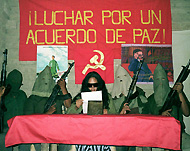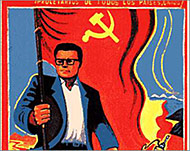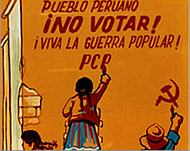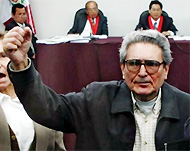The Shining Path to victory
In August 1980, a breakaway faction of the Peruvian Communist Party issued a statement announcing its intention to launch a “people’s war” against the government.

The document, titled “We are the Initiators”, is threatening yet also poetic.
“We are trumpets of the future, the inextinguishable fire that crackles in the stormy present,” it reads.
“From the barrels of guns everything will come.”
Those guns would be held responsible for the deaths of about 30,000 people during a 20-year period, according to a Peruvian commission responsible for documenting the violence.
The Shining Path, named after a quote from the founder of Peru’s first communist party, Jose Marategui, launched a campaign of bombings, assassinations and sabotage that brought the government close to collapse.
 |
|
The Shining Path came close to |
Marategui was a strong influence, but the group’s guiding light was Mao Zedong.
The leader of the Shining Path was Abimail Guzman, a former philosophy professor and a devotee of Mao who visited China many times during the Cultural Revolution.
“Guzman’s speeches were so similar to Mao’s that he could almost be accused of plagiarism,” says Cynthia Mclintock, an international affairs professor at George Washington University in the US and author of a book on the Shining Path.
Military training
Guzman became an adherent of the Gang of Four – the group of senior Chinese Communist Party figures, including Mao’s wife, Jiang Qing, who advocated a fundamentalist brand of Maoism and were later blamed for many of the excesses of that period.
 |
|
Guzman portrayed himself as an |
Like Mao, Guzman created a cult of personality around himself, calling himself “President Gonzalo” and creating a whole ideology – “Gonzalo thought” – that he saw as a development of Marx, Lenin and Mao.
In an interview with the Path’s El-Diario newspaper in 1988, Guzman described how he was taught in China not only to build a political party, but also to carry out “ambushes, attacks, military movements, as well as how to assemble explosive devices”.
“For me it is an unforgettable example and experience, an important lesson, and a big step in my development – to have been trained in the highest school of Marxism the world has ever seen,” he said of his time there.
‘River of blood’
The Chinese influence on the Shining Path was not only ideological.
 |
|
The path demanded a boycott of |
Political art used by group was inspired by Chinese communists and even uniforms worn by fighters were based on those worn by the Chinese.
A readiness to use violence against their political rivals on the left was also reminiscent of the Gang of Four’s leadership in China.
In famous speech Guzman said the movement would have to cross “a river of blood” to attain power.
The group targeted members of trade unions, left-wing mayors and women’s organisations in a bloodthirsty campaign that created a climate of fear.
Decline
 |
|
Guzman was captured in 1992 and |
Despite the bloodshed caused by the group, Mclintock says the Path’s coherent platform made it seem like an attractive proposition during a time when Peru was suffering from severe economic decline.
The Shining Path won much of its support among the young in rural communities in Peru’s mountainous centre, many of whom had attended universities such as Huamanga, where radical professors like Guzman taught.
The group’s Maoist ideology inspired confidence in the scientific inevitability of its victory and gave its leaders an aura of invincibility.
But it also meant the sharp decline of the movement when Guzman was captured in an apartment in Lima in 1992 and put on trial.
The Path also lost support in its peasant power base when it harshly punished them for the small infringements of Maoist beliefs, such as setting up rural markets to sell produce.
With Guzman captured and support waning, the idea of armed Maoist revolution gradually petered out, although small offshoots still remain active in 2006.